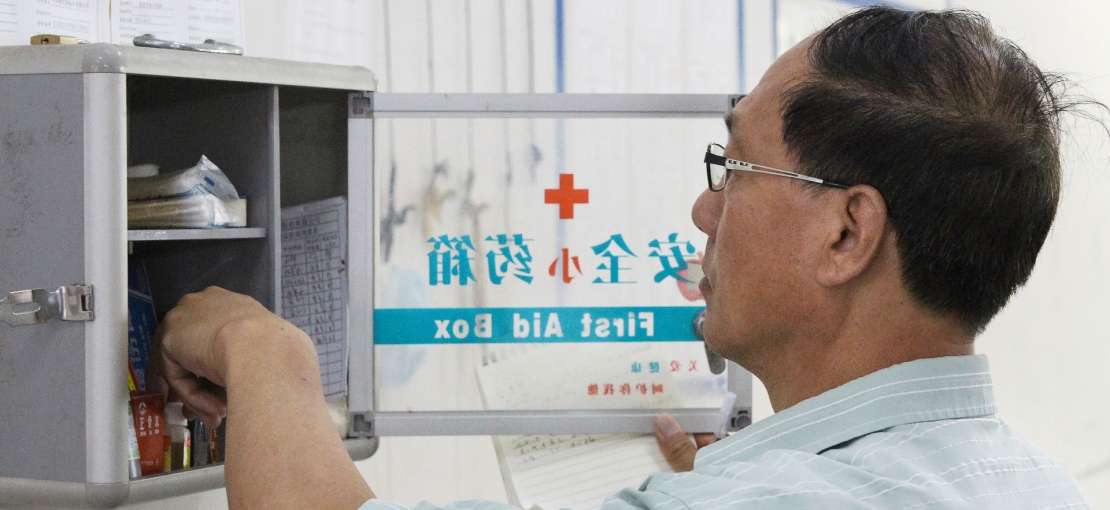
Occupational health and safety at our producers
In addition, all our producers are obligated to ensure safe working conditions and health protection. The obligation is as follows:
“A safe and hygienic working environment shall be provided, and the best occupational health and safety practice shall be promoted, bearing in mind the prevailing knowledge of the industry and of any specific hazards. Appropriate attention shall be paid to occupational hazards specific to this branch of the industry and assure that a safe and hygienic work environment is provided for. Effective regulations shall be implemented to prevent accidents and minimize health risks as much as possible (following ILO Convention 155). Physical abuse, threats of physical abuse, unusual punishments or discipline, sexual and other harassment, and intimidation by the employer is strictly prohibited.”
According to the OECD Due Diligence Guidance for Responsible Supply Chains in the Garment and Footwear Sector, workplace health and safety is an industry risk. Through Fair Wear's audits, we have also identified that workplace safety continues to be the area with the most concerns. These concerns are reflected in the risks we have identified for our supply chain. Below we list the identified risks:
We conduct regular audits and organize regular training sessions to minimize the likelihood of negative impacts occurring. In addition, we visit production facilities as part of the follow-up to corrective action plans. In addition, our CSR team conducts annual basic health and safety checks at the production facilities.
- Workplace safety: What are we doing about it?
We collaborate with the production facilities to make targeted improvements in workplace safety. - Fire safety: What are we doing about it?
We specifically ensure that there are sufficient fire extinguishers available and that they are easily accessible. We also check if evacuation plans are adequately displayed and if enough fire safety officers have been trained. - Chemical safety: What are we doing about it?
We pay specific attention to proper labeling and storage of chemicals, availability of instructions for their correct handling, and ensuring that workers using chemicals are knowledgeable about them. These risks mainly affect shoe production and processes in material manufacturing. (See also Hazardous Substance Management.) - Electrical safety: What are we doing about it?
We specifically check if machines are properly connected and if electrical cables are laid out safely. - Noise and temperature: What are we doing about it?
We specifically check if legal limits for noise and temperature are being followed. - Building safety: What are we doing about it?
We regularly assess if legal regulations are being adhered to and if there are potential risks related to building safety. - Machine safety: What are we doing about it?
If necessary, we organize specific training for workers operating machines.
All the listed risks are potential risks that we have identified in our production countries and that have an increased likelihood of occurrence. (See also Risk Overview).
Monitoring by independent auditors
An obligation in and of itself is not enough, of course. Therefore, all of our producers are regularly and independently audited by organizations such as Fair Wear and our own CSR Team. Auditors carefully examine all issues relating to occupational safety and health. The results of these audits are verified by document assessments as well as interviews outside and within the production facility.
Results of Fair Wear audits
Reviews of Fair Wear audits show that the majority of audit findings continue to relate to the issue of occupational safety. This is sometimes due to the fact that the management and workers lack an awareness and knowledge of occupational health and safety. Moreover, in the producing countries, although strict laws and occupational safety regulations do exist, there are no institutions that monitor companies in this regard (and when needed, penalizes them) such as the Employer’s Liability Insurance Association here in Germany.
Review of Production Facilities in Bangladesh
Starting in summer 2024, we will be manufacturing some VAUDE products in two production facilities in Bangladesh with long-term partners. After the collapse of the Rana Plaza building in 2013, building safety remains the biggest challenge in Bangladesh. That's why we joined the "International Accord" and the "Bangladesh Safety Program" from the outset. By involving brands, unions, factories, and workers in the textile and garment supply chain, we aim to:
- Promote a culture of workplace safety
- Prevent accidents related to fire, electrical, structural, and boiler safety
- Provide a reliable point of contact
Thanks to expert investigations, we have gained detailed insights into these production facilities. Safety is being enhanced through the implementation of necessary improvements.
We are improving occupational safety with these measures
The health of the workers who make our products is very important to us. Therefore, we work intensively with our producers to improve working conditions.
- Our local CSR employees are familiar with occupational safety and the applicable laws and support and supervise our producers in remedying findings.
- In addition to the audits and follow-up visits, we also evaluate each producer once a year regarding occupational safety.
- We work with various training providers to arrange for education for our producers, such as Better Work in Vietnam or SMART in Myanmar.
| GRI: | 403-1 |
| GRI: | 103 |



